The opposite of love is not hate, it's indifference."
- Elie Wiesel; Nobel laureate & Auschwitz/Buchenwald survivor
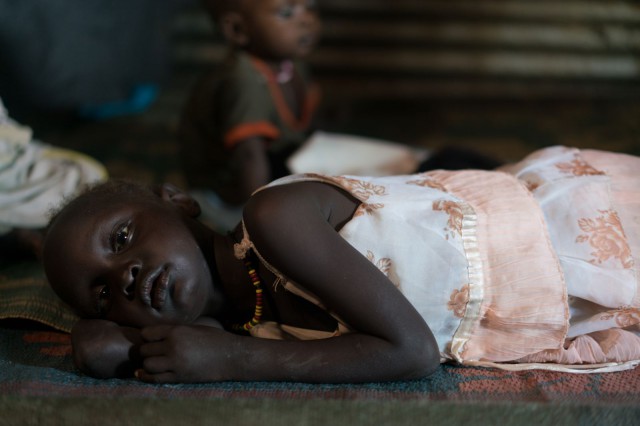
By Rory Winston
“Empathy suffers from jet-lag - it often wakes up only after it’s no longer possible to do anything to help,” said my father, a man who lost many relatives to the holocaust. He was convinced that most of us want to feel like good people so long as we never have to act accordingly. And so, words like ‘rescue’ are often preceded by 'would have' and followed by 'if only.' Everyone today would have tried to rescue Jews from the Nazis if only they would been alive at the time. Everyone would have put an end to the era of witch trials if only they had realized it was no more than a veiled misogynistic attempt to oppress women. As for most of the actual people who were alive at the time and could have done something to stop the atrocities, they acted like most of us do today when confronted by humanitarian crises such as refugees and saving children from starvation. They would have done nothing. With few exceptions, most of us do no more than furrow our brows, pout a bit, and look forward to feeling publicly bad about it later.
We ‘care’ as long as caring remains at a safe distance from taking an action. We ‘care’ as long as it costs less than the ‘we couldn’t care less’ alternative. But ‘care’ should not be confused with mere concern. Care - by very definition - is both a noun that involves vigilance and awareness as well as an action verb that entails providing for the needs of others. In short, caring about something is not the same as pressing Like under an article about a philanthropic cause; rather, ‘care’ means making it our business to know who needs our help and how to take action. It is little wonder then that the charitable organization that goes by the name of CARE is so focused on South Sudan.
The WOMEN of TOMORROW
As a primarily Christian based nation that divorced itself from Sudan in the early part of this decade, South Sudan is presently – as of July 9th – celebrating its fifth anniversary. Torn by interethnic tribal warfare, the world’s youngest country has, over the course of its very short existence, been plagued by one of the most tumultuous and deadly armed conflicts in the history of the region – a civil war that began in 2013 and has already claimed up to 300,000 lives and has resulted in a further 400,000 fleeing to neighboring countries and more than 1,000,000 being displaced. With notorious events such as the Bentiu massacre being one among many of the recent calamities to affect the local population, it does not take a great leap of imagination to fathom the plight of the country’s children. Because CARE has long believed that empowering women is a fundamental tool in fighting poverty since it benefits the economy of each family and the community at large, what better way to see both the shortcomings and the hopes of this fragmented nation than by surveying several of the women of tomorrow with the help of CARE’s photo journalists. Since the country itself is celebrating its fifth birthday, its only apt that we take a perfunctory look at some of the five-year old girls who may become the leaders of tomorrow – women who may usher in a more peaceful and more prosperous era, one capable of turning South Sudan into the great unified nation it is capable of becoming.
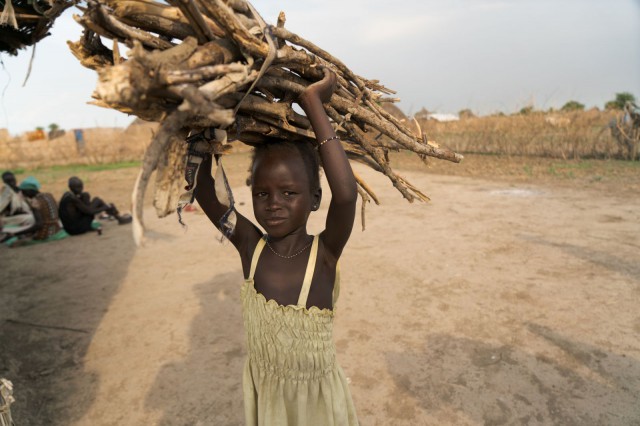
The Shadows of South Sudan
Zeieya does not attend school. Like most local girls her age, she is already a fulltime laborer for whom education is an unattainable luxury. With the highest ratio of girls who can’t attend school of any country in the entire world, South Sudan holds little promise of any kind of future for young women; instead, these young inhabitants court death at every turn. The tribal wars coupled with the bleak and sweltering landscape where temperatures soar to 38 Celsius (approximately 100 F) and water – let alone clean water – is a rarity turns every single day into a game of mortal combat.
Having been exposed to the history surrounding the holocaust from an early age, I find it eerily easy to understand how otherwise civilized people can remain utterly indifferent to the overwhelming suffering of others. While the fate of Jewish children in the Warsaw Ghetto was mostly limited to death by starvation and disease or death by extermination, South Sudan’s 680,000 malnourished children are caught between annihilation from famine and disease or death as a casualty of war. Though I am in no way making a comparison between these two events, the one constant in both is the muted response of the “civilized bystander.” The fate of the South Sudanese is a painful reminder of the one recurring historical theme: indifference. A vast multitude of people still live in an environment that we as Westerners all but ignore. For those like Zeieya, the world remains as cruel and inhospitable as ever.
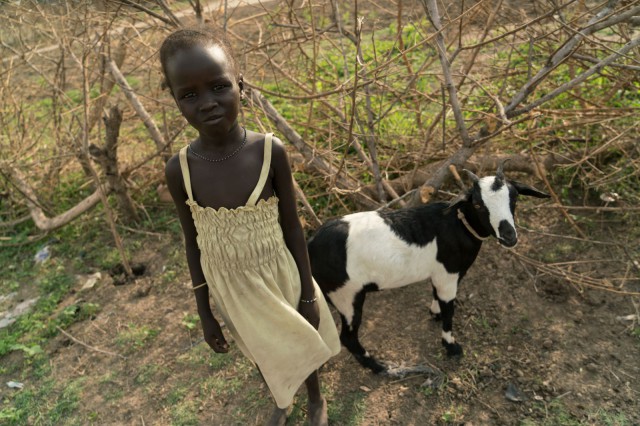
Back in 2014 – as the civil war swept through the country– 2.3 million locals lost their home. Zeieya was one of them. Today, she spends most of her day collecting firewood which she then sells for a pittance in the hopes of making enough for her and her family to get by on. Though her own means of existence is tenuous at best, she is nevertheless proud of her ability to keep another living thing alive as she joyously tends to their family’s one hidden treasure, a solitary goat. Feeding and grooming this goat on a daily basis, this creature has come to represent a glimmer of hope for a better future. After all, if all goes better than expected, the goat may one day give birth to a kid which would mean that their family would temporarily have some milk to drink. This vision of brighter days ahead, coupled with a strength derived from keeping another life form alive endows Zeieya with a strength and wisdom that almost seems oddly out of place on a five-year old child. Then again, perhaps it is precisely the fact that another life is dependent on her that drives her to persevere. Her sense of responsibility for another’s existence is a valuable reminder for all those who have lives far less perilous than her own and especially all those, like us, who have the means of helping others – such as Zeieya herself – survive.
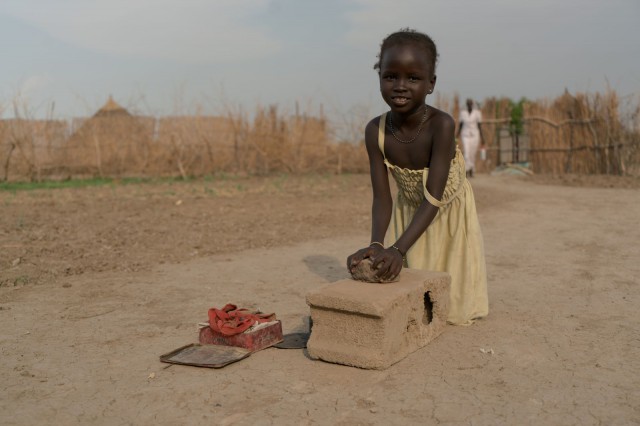
IMAGINARY FOOD for the SOUL
Though Zeieya has no toys, she is like any other child and so she plays. Her favorite game is a third world favorite: the preparation of an invisible feast. Diligently collecting imaginary sorghum – a grass-like plant – Zeieya meticulously grinds the invisible ingredient into a fine powder before carefully collecting each speck in a sack made of air. Once gathered, she methodically prepares an elaborate meal for herself and her family. Although to the untrained eye, Zeieya’s prized dish may seem like no more than a delusion born of famine – an emotional equivalent of a mirage for the thirsty wanderer in a desert – for those like Zeieya, the sacred invisible meal is nourishment for the soul. It is food for hope, aspiration and hunger cooked at just the right temperature. Along with 2.8 million people in South Sudan, Zeieya is among those in urgent need of food assistance.
Like Zeieya, Nyahok had lost her home to the war as well. It had been burnt to the ground. With precious few clean wells in her area, she – like the other children in her proximity – is forced to drink dirty disease-laden water. Nearing on five, Nyahok subsists on a porridge of grains and wild leaves.
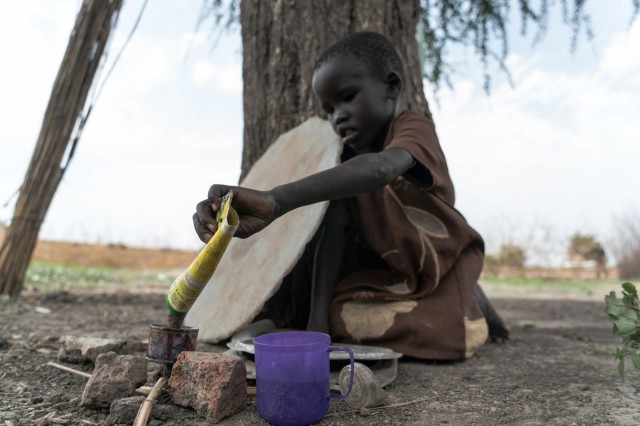
With no crops or cattle in their region, these ingredients are the only thing her mother can feed her. Nyahok’s favorite game is mixing dirt with water and pretending she’s cooking food.
EMPATHY SANS FRONTIERS
Though this may sound like something from the mouth of a B-movie screenwriter at a pitching session in Hollywood, the following statement is true: A five-year old girl whose house was destroyed during a military siege runs into a forest where she survives on her own for days before finally finding shelter in a UN camp. Chianyal, the resilient character in question, is not only a real person but is someone whose inner strength, gumption and perseverance continues to mystify.
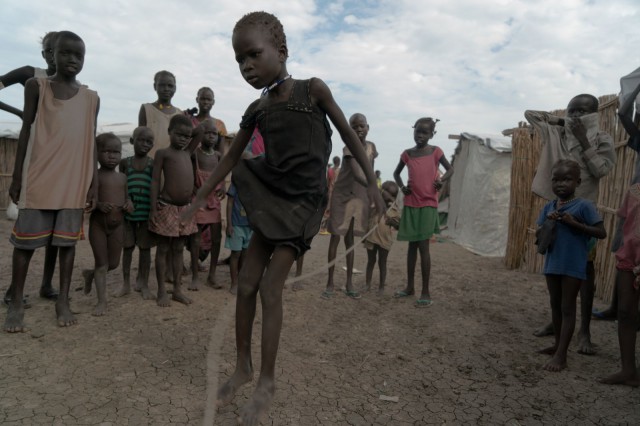
Having contracted malaria in May, Chianyal still suffers from sporadic fevers in the night. Though the UN has declared that the recent outbreak of the disease is both dangerous and unprecedented, Chianyal continues unimpeded, skipping rope and making mud figurines with other children in the camp.
Despite her age, Chianyal – like all the other kids – does not attend kindergarten. Instead, the five-year old looks after Nyanen, her baby sister. Although Chianyal’s ordeal leading up to rescue may be singular, the events that preceded them and followed are a normal part of life in South Sudan where 2.3 million inhabitants have lost their home since the fighting first began in in 2013.
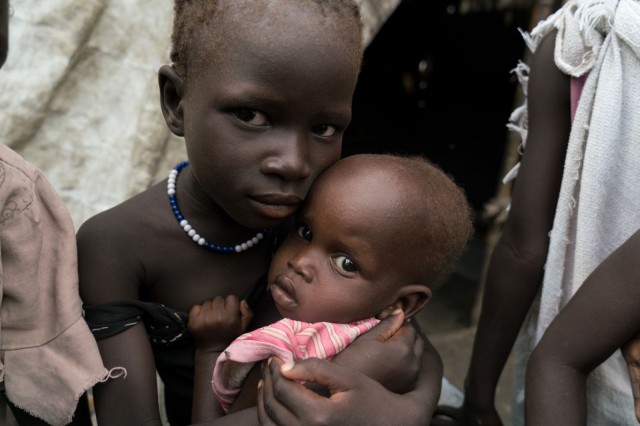
Like Chianyal, 180,000 South Sudanese live in UN protection camps, and like her, all of those camp inhabitants depend on aid groups simply for having access to clean water. At present, water is still so scarce that Chianyal and many like her can only wash themselves with a very limited number of cups (sic) of water. For all its lack of resources, the UN camp remains a lifeline to many in need.
In fact, it is in a UN camp just such as this that Nyasunday – also age 5 – has been living since her home was burned down. Rather than attending school where there would be no food anyway, Nyasunday spends a portion of her day helping her mother carry buckets of drinking water to their compound. Severely malnourished, until CARE had given her food, Nyasunday has made a remarkable recovery and can be counted among the lucky ones who have survived thus far.
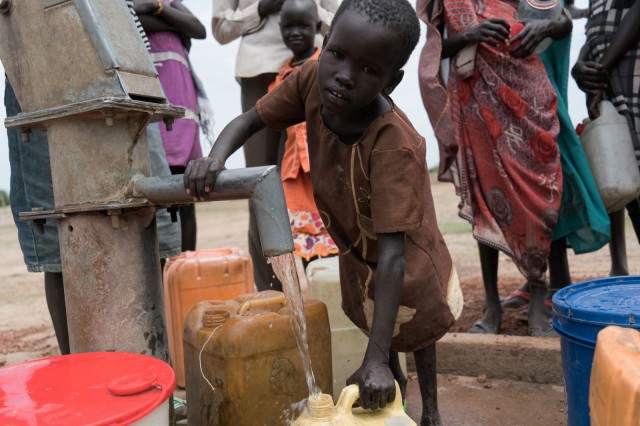
South Sudan may not be a country familiar to all, its geopolitical turmoil not of the type to affect us directly, its tragedies not among those considered most newsworthy, its humanitarian crisis not of the ilk to elbow its way into our daily conversations; but ignoring the imminent threat to millions of South Sudanese lives makes us complicit in murder. Apathy to their suffering turns us into the willing accomplices of famine, the enablers of deadly diseases, and the callous silent partners of uniformed thugs. Indifference to the plight of men, women and children anywhere is a drone strike whose target is our own humanity. It will hit us where we live, altering our core values and our lives forever. At present, we are living in the shadows of the Dark Continent – their ongoing pain signals our own unwitting demise. Until we take concrete action, until we help organizations like CARE improve the existence of those less fortunate than ourselves, the shadow cast by their suffering will grow until it eclipses our very future. As the renowned playwright G.B. Shaw wrote in the Devil’s Disciple: “The worst sin towards our fellow creatures is not to hate them, but to be indifferent to them: that’s the essence of inhumanity.”
All photographs have been taken by CARE as part of a photo essay collaboration on the subject of 5 year old girls in South Sudan. The article has been syndicated and is published herein with the explicit consent of Women's Rights News, a member of the Viral Women






